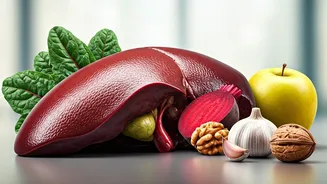Liver and Diabetes
The connection between the liver and type 2 diabetes, along with fatty liver disease, is significant. These two conditions are often observed together,
underlining the crucial need for understanding their relationship. The liver, which is responsible for numerous metabolic functions, can become compromised in individuals with diabetes. Insulin resistance, a hallmark of type 2 diabetes, contributes to fat accumulation in the liver, leading to fatty liver disease. Over time, this fat buildup impairs the liver's ability to function properly, possibly worsening blood sugar control, and increasing the risk of more severe liver conditions. Recognizing this link is a significant step toward managing both conditions proactively. Addressing diet and lifestyle choices can positively impact both diabetes and liver health.
Peas for Digestion
Incorporating peas into your diet can yield several health benefits, particularly concerning digestion. Peas are rich in fiber, which is essential for improving the digestive process by regulating bowel movements and preventing constipation. Furthermore, consuming peas can help reduce bad cholesterol levels. Fiber helps to bind with cholesterol in the digestive tract, preventing its absorption and thereby lowering overall cholesterol levels in the body. Pea consumption supports weight management. Since peas are high in fiber and protein, they promote a feeling of fullness. This can prevent overeating and contribute to weight loss. Pea consumption should be a component of a well-balanced diet focused on overall well-being.
Sweet Potatoes Regulation
Sweet potatoes are a beneficial addition to any diet focused on regulating blood sugar levels. Sweet potatoes have a medium glycemic index, which means they cause a slower and more gradual rise in blood sugar levels compared to high-glycemic foods. This is due to their fiber content and complex carbohydrates. By eating sweet potatoes, individuals can experience better blood sugar control, reducing the likelihood of dramatic spikes and crashes. Moreover, sweet potatoes contain nutrients like vitamin A and antioxidants, which support overall health and may reduce the risk of diabetes complications. Including sweet potatoes as part of a balanced diet provides an approach to maintaining stable blood sugar and improving metabolic health.
The Best Diet
To effectively manage both diabetes and fatty liver disease, it is essential to consider the best dietary approaches. A dietary strategy centered around whole, unprocessed foods is highly beneficial. Focus on incorporating fruits, vegetables, whole grains, and lean proteins while minimizing the intake of processed foods, sugary drinks, and saturated fats. A diet rich in fiber, which is abundant in vegetables and whole grains, can help control blood sugar levels and improve liver function. Limiting sugar and simple carbohydrate consumption is essential to prevent rapid blood sugar spikes. It's also essential to be aware of portion sizes to help manage weight. Consulting with a healthcare professional or a registered dietitian is recommended to create a personalized meal plan tailored to your specific needs, and to achieve optimal health outcomes.
Exercise for Protection
Incorporating regular exercise into your routine is vital for protecting the liver and managing blood sugar levels. Physical activity enhances insulin sensitivity, which is critical for people with diabetes, allowing cells to utilize glucose more efficiently and decreasing the risk of blood sugar spikes. Exercise promotes weight management, which is essential, as obesity is a significant risk factor for fatty liver disease. Exercise supports overall liver health. It promotes metabolic health, improves cardiovascular function, and reduces the buildup of fat in the liver. Aim for a combination of aerobic exercises, like brisk walking or cycling, and resistance training to gain the most benefits. Regular exercise offers multifaceted benefits for individuals with diabetes and fatty liver disease, supporting optimal health and well-being.





















